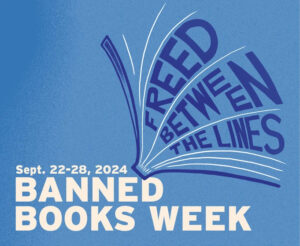 Editor’s Note: This week is the American Library Association’s Banned Book Week. The following blog post looks at a history of book challenges in the US and how these efforts have massively escalated in the 2020s.
Editor’s Note: This week is the American Library Association’s Banned Book Week. The following blog post looks at a history of book challenges in the US and how these efforts have massively escalated in the 2020s.
Books are capable of inciting great passion in readers who love them and those who hate them. So wherever there are books, there are people who will want to ban or control them for one reason or another. Attempts at control can range from removing the book from a school library to threatening to kill the author.
Until recently, most book censorship efforts in the United States were local rather than national in scope, with efforts focused on removing specific titles from school libraries or reading lists. Typically, the focus was on books thought to contain sexually explicit material, offensive language, violence, or offensive treatment of religion. Other reasons given are for being “unsuited” for a given age group or for being “anti-family.”
Occasionally, though, a book’s publisher would instigate the censorship. Ray Bradbury’s novel Fahrenheit 451 tells the story of a “fireman” whose job is to burn books rather than put out fires. (Fahrenheit 451° is the temperature at which book paper starts to burn.) The book was originally published in 1953, but in 1967, Ballantine Books brought out an edition for high schools that modified 75 passages in the text to eliminate such words as hell, damn, and abortion. This was done without Bradbury’s knowledge or consent. When he found out about it 13 years later, he demanded that the edited version be withdrawn.
Different titles show up on various lists of banned or challenged books, but a few appear repeatedly. Maya Angelou’s I Know Why the Caged Bird Sings has had its position on many school reading lists challenged because of its description of the rape of the author as a child. Other frequently challenged books include the Goosebumps series by R. L. Stine, J. D. Salinger’s coming-of-age novel The Catcher in the Rye, and Kurt Vonnegut’s account of the firebombing of Dresden, Slaughterhouse-Five.
But in the 2020s, there started to be coordinated efforts nationwide to remove all books from public schools that included depictions of sexual activity, LGBTQ+ content, material that could make people feel uncomfortable about race, and material that was critical of police.
In 2023, the Washington Post took a deep dive into the issue of who was objecting to books in schools and what kinds of books these people disliked. Reporters looked at more than 1,000 challenges filed during the 2021–22 school year from 150 school districts nationwide. Topics objected to included a biographical book on assassinated gay San Francisco politician Harvey Milk, a story about a boy who dresses as a mermaid, and a story about a Black child’s reaction to the killing of a girl by police in his hometown.
WaPo reporters also found that a small number of people were responsible for a large proportion of the challenges. In fact, the Post’s research found that just 11 people were responsible for 60% of all the objections. That meant that 6% of the objectors were responsible for 60% of the objections. One woman who submitted 24 challenges went online looking for books she might object to, checked them out from a local library, and then filed her challenges. Among the titles she was attempting to remove were Vladimir Nabokov’s Lolita, Khaled Hosseini’s The Kite Runner, and Toni Morrison’s The Bluest Eye. Other efforts to challenge books have come from activist groups such as Moms for Liberty who would look for books they might object to by searching for “keywords such as ‘incest,’ ‘rape,’ and ‘pedophilia’” in the school library’s catalog.
Work done by the writers’ group PEN America found 2,362 instances of book bans in the United States during the 2022–23 school year. PEN’s research showed that in addition to activists working to remove books, several states have passed laws requiring school districts to remove whole categories of books from libraries and classrooms. Florida, which passed stringent limits on books that could be housed in schools, had more than 40% of all book bans in the United States, followed by Texas, with 625 book bans.
The American Library Association has been tracking the most-challenged books for many years. Challenged books are those that some individual or group has attempted to remove or restrict. The challenger does not need to have been successful in getting the title banned for it to appear on the list. Not all challenged books are contemporary. Several classics have received complaints as well. According to the American Library Association, the following books are frequently challenged:
- The Scarlet Letter by Nathaniel Hawthorne, because a book about adultery conflicts with a community’s values
- Of Mice and Men by John Steinbeck, because it contains profanity
- Twelfth Night by William Shakespeare, because the comedy is perceived as promoting homosexuality
In a North Carolina school district, merely discussing school book censorship became controversial when district officials told principals not to have their schools participate in events tied to the American Library Association’s annual Banned Book Week. The message to principals said, “It is not something we teach in our classrooms or as supplementary material for out of school learning.” The district was also concerned that discussion of banned books might violate a new state law that said parents had the right to control what their children learned in school. Edward Helmore, writing for the British newspaper The Guardian, said that this might be the first time that “efforts to draw attention to banned books has itself been banned.”
Have you encountered efforts to ban books from school or public libraries in your community? If so, tell us about them in the comments.
